Table of Contents
- Brush after each meal to ensure plaque-free teeth
- Rinse with a fluoride mouthwash at night to prevent cavities
- Floss once a day to get rid of bad breath
- Special cleaning tools for better cleaning
- Use of dental picks as and when needed
- Clean your retainer for healthy mouth and teeth
- Healthy diet for healthy teeth
- Regular dental checkups for better treatment
Wearing braces is an investment that you make to have beautiful, perfect white teeth, but unfortunately, it predisposes you to a whole lot of oral hygiene related issues. It is difficult to maintain a good oral hygienic with braces on and that’s the reason why brace wearers are more prone to unpleasant dental problems like demineralization, tartar, gingivitis, plaque, sensitivity and Halitosis. If these problems are left untreated, they can present some serious complications that could prolong the period of treatment as the Orthodontist would have to temporarily remove the braces and treat the infected mouth and gums first.

Therefore, it is of utmost important that you focus on oral hygiene and understand the implications dental issues may pose during orthodontic treatment. Here is a complete guide to maintain oral hygiene for healthy teeth while you are wearing your braces:
Brush after each meal to ensure plaque-free teeth
When you eat food, the food particles tend to trap in and around braces, especially in areas between your gums and the brackets. These areas become the breeding grounds for bacteria to proliferate, leading to plaque. Brushing your teeth after every meal keeps your teeth free of plaque. It is recommended to brush for least 2-3 minutes each time after every meal with a toothbrush that has soft bristles. If you want to use an electric toothbrush, an ultrasonic toothbrush may be your best bet. It uses very high frequency of vibration (ultrasound) to remove plaque which is formed in difficult to reach areas. However, you need to be careful while choosing an electric brush as some models can cause damage to the delicate braces. Always choose the one that has soft bristles.
Rinse with a fluoride mouthwash at night to prevent cavities
Once you are done with brushing your teeth and braces at night, the last thing you should do is rinse using a fluoride mouthwash. The mouthwash reaches the places in your mouth that a toothbrush cannot reach. It forms a layer of protection all night long to prevent tooth decay and gum disease. It keeps your breath fresh and also prevents formation of white spots on teeth.
Floss once a day to get rid of bad breath
Flossing is the best way to clean the areas of the mouth where the toothbrush is unable to reach. Threading floss under the arch wire and in the spaces between the gum line and the wire dislodges the trapped food particles that are responsible for foul breath.
Special cleaning tools for better cleaning
Alternative cleaning tools like the water flossers are easily available and are found useful in cleaning different types of braces, bridges, crowns and dental implants. It clears food debris and plaque from in between the appliance and teeth by shooting pulsating, concentrated bursts of water. Water flossers are known to remove plaque, reduce gingivitis and improve the overall gum health. It is clinically proven to be more effective than dental floss. They are a bit expensive, but they are totally worth the investment.
Use of dental picks as and when needed
If you find regular flossing difficult, dental pick may be a good option to clean between the tooth. Dental picks allow better maneuverability than floss. These products can get between and around the teeth easily.
Clean your retainer for healthy mouth and teeth
Your retainers spend a lot of time in your mouth. Therefore, it is essential to keep them clean and free of germs. You can soak your retainer every day for a few minutes in a cleaning agent that is recommended by your Orthodontist. You can brush your retainer with a soft toothbrush and a little toothpaste.
Healthy diet for healthy teeth
You diet is probably the most important thing in caring for your teeth while undergoing orthodontic treatment. You should avoid foods that increases your risk of cavities or damages your wires or brackets. Refrain from eating hard and sticky foods like hard boiled candies, toffee, chewing gum and caramel. These types of foods can easily get stuck in the brackets and wires and cause damage to your braces. The stuck food also provides sugar for the bacteria to feed on. The more sugar you eat, the higher the risk of tooth decay.
Regular dental checkups for better treatment
Be regular with your scheduled dental appointments. Regular cleaning through a professional family Orthodontist is an important part of your orthodontic treatment to avoid cavities that could interfere with the treatment.
Maintaining a good oral hygiene is important, especially when you are wearing braces. So, when the braces treatment is over and when the braces come off, your teeth will not only look good but will also be healthy and strong. It is worth maintaining high standard of oral hygiene even after your treatment to keep your healthy, beautiful teeth last a lifetime.




